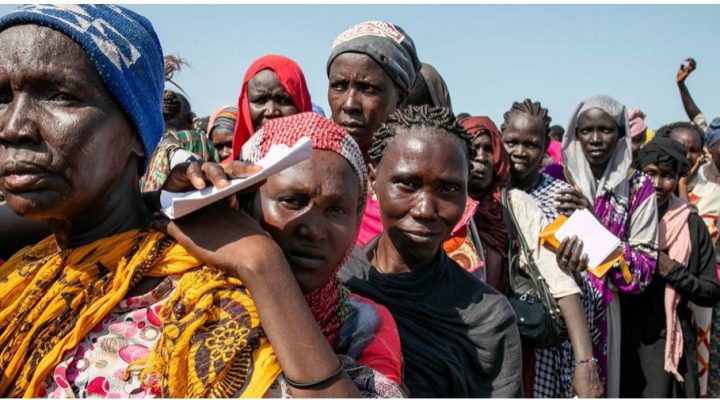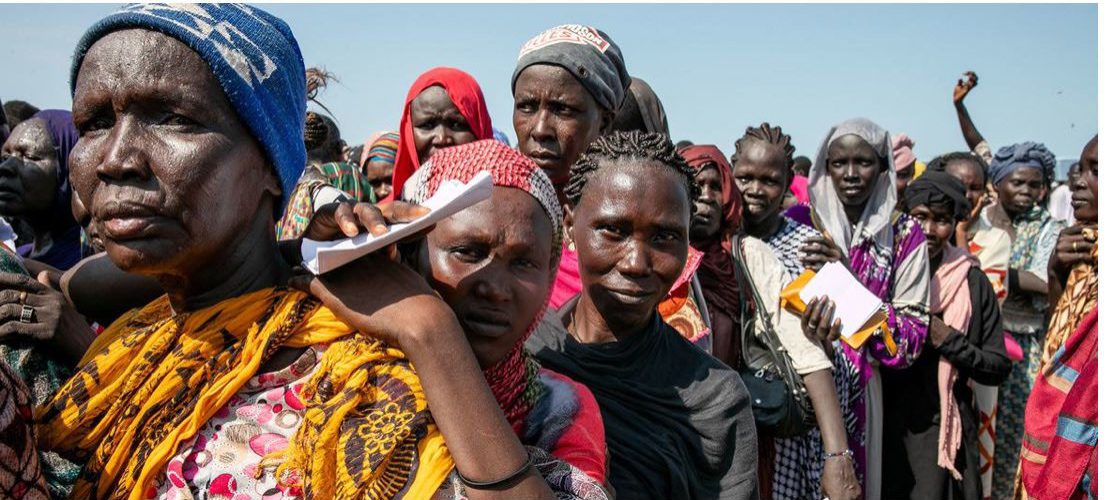Of all the epicenters of wars in the world today, none has triggered as much displacement of citizens as in Sudan, the Northeastern African country of about 46 million people, according to the International Rescue Committee.
The IRC says Sudan’s lingering conflict — caused by two power-hungry men and their loyalists, Abdel Fattah al-Burhan, leader of the Sudanese Armed Forces, and Mohamed Hamdan Dagalo, head of the paramilitary Rapid Support Forces — has caused thousands of deaths, extensive destruction of property and forced millions of the country’s citizens out of their homes or country.
The result, the IRC says, is “the world’s largest displacement crisis.”

Jens Laerke (Screncap from UN Web TV)
In spite of this dire emergency, Sudan’s crisis doesn’t get the attention it deserves from aid institutions and so the appeal for funding by humanitarian agencies has fallen short of expectations. This was disclosed on May 17 at a press conference in Geneva where Jens Laerke, spokesperson for the Office for the Coordination of Humanitarian Affairs, said: “We speak a lot about funding and underfunding, but this time, we are really serious. In Sudan, half of the population — 25 million people — need humanitarian aid. Famine is closing in. Diseases are closing in, the fighting is closing in on civilians, especially in Darfur.”
He added that the overall response plan aimed to reach and support 15 million of the worst affected people, but so far little has been achieved. “Collectively, we asked for $2.7 billion. As of today, four and half months into the year, we have received 12% of that.”
The appeal, Laerke said, is not just an underfunded appeal, “it’s a catastrophically underfunded appeal.”
Without more resources coming in fast, he warned, humanitarian organizations won’t be able to scale up in time to stave off famine and prevent further deprivation in Sudan and neighboring countries people have fled to.
“We are urging the need to bring in more food, health services, shelter, water and sanitation but also for the prevention of sexual and gender-based violence; help to the victims and support for the reopening of schools for our school children,” he urged.
Now is the time, he said, for donors to make good on pledges, to step up and help Sudan and be part of changing the current trajectory that’s leading toward the cliff’s edge.
“Don’t be missing in action,” he begged.
Speaking at the same event, Shible Sahbani of the World Health Organization said 13 months of war in Sudan has nearly destroyed the country’s health system as it is faced with collapse.
“Close to 16,000 people have died and 33,000 have been injured, but the toll of the war is probably much higher,” he said. “The recent escalation of violence in Khartoum (and other places) is alarming and causing more injuries and deaths among civilians as access to health facilities and services is hampered by insecurity. Both the displaced and those who remain in their localities lack access to basic necessities like food, water, shelter but also health care, while diseases like cholera, measles, dengue fever, malaria are all spreading.”
He added: “As we speak, two-thirds of the 18 states in Sudan are experiencing multiple outbreaks; at least three ongoing outbreaks.” With the approaching rainy season, the risk will be even higher.

(123rf.com)
While proper care and disease outbreak surveillance are among the WHO top priorities, the agency is also concerned about the lack of treatment for people suffering from chronic conditions such as diabetes, kidney failure, hypertension and other heart diseases.
“The lack of access to basic health care (and medicines) is putting lives at risk in a country with a high (build up of) noncommunicable diseases,” Sahbani warned, adding that even before the escalation of the conflict, noncommunicable diseases accounted for more than 51% of mortality in Sudan and that around 1.4 million Sudanese people living with diabetes risk disability and death without proper health care services.
On top of that, famine looms, especially in parts of Darfur and Khartoum, with more than one-third of the population facing severe hunger.
“The number of under-5 children and pregnant and breastfeeding women suffering from acute malnutrition has increased, from 3.9 million in 2023 to around 4.9 million in 2024. Attacks on health care and humanitarian workers worsened the lack of access to health services and put patients, health workers and humanitarian workers and assets at grave risk.”
Prior to the Geneva event, the IRC released a report chronicling the cost of the war on the Sudanese population. The research, titled “Sudan Crisis Report: One Year of Conflict,” says the conflict that began on April 15, 2023, turned Sudan into one of the world’s worst food insecurity emergencies.
“Eighteen million people are acutely food insecure — meaning that their lives are in danger from a lack of available, affordable food; nearly 4 million children under 5 years old are malnourished. Almost 5 million people are on the brink of famine,” the report said in part.
It also highlighted the collapse of health care services, noting that “with 70% of health care facilities in Sudan’s conflict areas either destroyed or forced to close, and an estimated 11 million in need of urgent medical care, Sudan’s health care system is on the brink of collapse.”
Nearly half the population is unemployed and the cost of basic food in some areas has increased by more than 300% since the start of the conflict. As a result, millions of people risk starvation, the IRC says. “Immediate action is needed to avoid mass deaths.”
Related articles:
Sudan’s worsening conflict raises alarm of another humanitarian crisis
Amid Sudan war and elsewhere, water scarcity threatens lives


